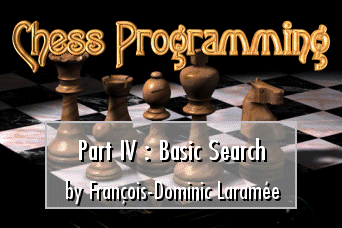11/10 - 11/12 @ Montréal, Canada
12/5 - 12/7 @ Shanghai, China
12/24 - 12/27
2/28 - 3/4 @ San Francisco, CA
More events...
2406 articles in the reference section.
Help us fight cancer!
Join SETI Team GDNet!

|
Computer Playing StyleIterative deepening alphabeta combined with a transposition table (and a history table to kickstart the effort) allows the computer to search every position relatively deeply and to play a reasonable game of chess. That being said, its Minimax ancestor imposes a very definite playing style on the computer, one which is not exactly the most spectacular in the world. For example, suppose that the machine searches a position to depth 8. While looking at a certain move, it sees that every possible response by the opponent would let it win the game in dazzling manner... Except for a single opaque, difficult, obfuscated and almost maddeningly counter-intuitive sequence, which (if followed to perfection) would allow the opponent to salvage a small chance of eventually winning the game. Against a human player (even a Grandmaster), such a trap might turn the game into one for the history books. However, if the machine then finds a boring move which always forces a draw, it will immediately discard the trap, because it assumes that the opponent would find the perfect counter, no matter how improbable that is, and that the draw is the best it can hope for! As a result, you might say that machines play an overly cautious game, as if every opponent was a potential world champion. Combined with the fact that computers often can't search deep enough to detect the traps which human players devise against them, this allows very skilled humans to "waste time" and confuse the machine into making a blunder which they can exploit. (Human players also study their opponent's styles for weaknesses; if Kasparov had been given access to, say, a hundred games played by Deep Blue before their match, he might have been able to find the flaws in its game and beat it. But we'll never know for sure.) Next MonthIn Part V, we will discuss the limitations of straight, fixed-depth alphabeta search, and how to improve playing strength using techniques like the null-move heuristic, quiescence search, aspiration search and MTD(f), and the "singular extensions" which made Deep Blue famous. Hold on, we're almost done! François Dominic Laramée, August 2000
|